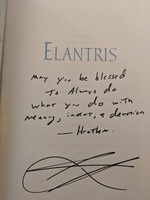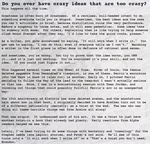Questioner
Do you ever have crazy ideas that are too crazy?
Brandon Sanderson
This happens all the time.
Greatness is often born of brashness. Of a reckless, bull-headed intent to do something everyone tells you is stupid. Sometimes, the best ideas are the ones you can't articulate in brief, because distillation ruins the very performance. Reduce a symphony to three notes, and it will seem pedestrian. Some ideas take to summary with ease. For others, explaining them is like trying to help someone climb Mount Everest after they say, "I'd like to take the quick route, please."
As a writer, you grow accustomed to saying, "It will work when I write it." You get use to saying, "I can do this, even if everyone tells me I can't." Becoming a writer in the first place is often done in defiance of rational good sense.
And sometimes, you're wrong. You try to prove that the idea works, you OWN it…and it's just not working. You're convinced it's your skill, and not the idea. If you could just figure it out…
This happened several times on The Wheel of Time. River of Souls, the famous deleted sequence from Demandred's viewpoint, is one of these. Perrin's excursion into the Ways in book 14 (also cut) is another. Early on, I pitched Perrin deciding to follow the Way of the Leaf to the team–but I wasn't actually serious on that one. More, I was in a brainstorming session with Team Jordan, and throwing out things that could possibly fulfill Perrin's arc in an unexpected way.
The 10th anniversary of Elantris has some deleted scenes, and the annotations talk about how in that book, I originally decided to have Hrathen turn out to be of a different nationality (secretly) as a twist at the end. The man who was doing all these terrible things was from Arelon all along!
That was stupid. It undermined much of his arc. It was a twist to just have another twist–in a book that already had plenty. Early reactions from Alpha readers helped me see this.
Lately, I've been trying to do some things with backstory and "cosmology" for the Stephen Leeds (aka Legion) stories, and Peter's not sold. We'll see if this turns into a "it will work when I write it" or a "That's a twist you don't need, Brandon."


